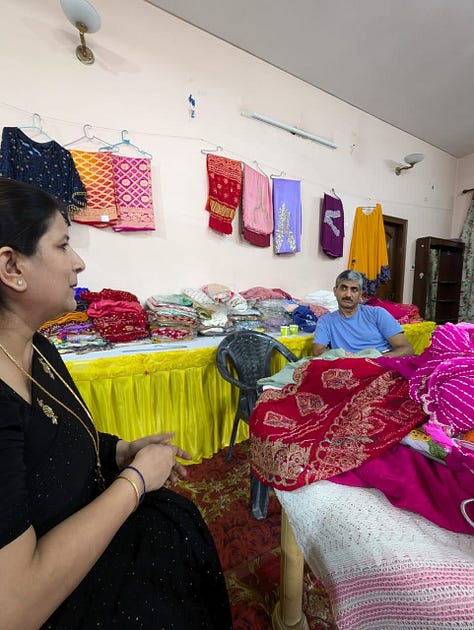Is the future really here, or are we just scratching the surface? How will technology and platforms reshape the way we live and work? As individuals, are we ready to embrace this new era, where AI-driven augmentation and automation redefine our roles? What if a large well oiled, deep pocketed Relia’ble Indian Corporation make headlines with bold steps toward this future, hinting at far-reaching changes that could transform industries and everyday life. Are we prepared to navigate this rapidly evolving landscape?
Before we dive in further, if you are reading for the first time, please subscribe for a weekly email discussing Running Platform Marketing Life.
AND if you are a friend of the RPML, do share it with others. You can add more of your friends to the Community of Platform’ed by using the following link.
Do share your feedback on this newsletter if you have not done it yet.
DTW
During the Week, Reliance Industries Limited’s Chairman Mukesh Ambani showcased a transformative vision for India's future at the recent AGM of Reliance Industries, held on August 29, 2024. He outlined the company’s strategic focus on four key areas: agriculture, education, healthcare, and small businesses which might significantly benefit from AI-driven innovations, setting the stage for unprecedented economic growth and societal transformation in India .
In Mukesh Ambani's speech, a strong emphasis is placed on the role of technology in transforming various professions through platforms, both in low-tech and high-tech contexts. The entire team through multiple product demonstrations highlighted how platforms like Jio's AI Everywhere and Connected Intelligence initiatives are democratizing access to advanced technology across India.
For instance, in agriculture, AI-driven platforms will empower farmers with tools that conserve resources, optimize yields, and introduce new economic activities in rural areas. Similarly, in healthcare, AI platforms will revolutionize diagnosis and treatment, making healthcare more accessible and improving the quality of life across the nation. Moreover, for small businesses, AI Vyapar platforms will enhance decision-making, automate tasks, and open avenues for global competition, even for businesses in Tier III cities.
These examples illustrate that platforms are not just tools for businesses but are reshaping personal and professional lives across the board. As professionals in different fields engage with these platforms, they will be able to leverage AI and other advanced technologies to innovate, increase efficiency, and drive new levels of productivity. The speech underlines that this transformation is accessible to everyone, across socio-economic backgrounds, ensuring that the benefits of technology are not limited to a select few but are spread across the entire population, thereby driving inclusive growth and prosperity
In today's world, the rapid advancement of technology has led to significant changes across professions, impacting both low-tech and high-tech areas of our lives. Whether we're talking about artificial intelligence (AI), machine learning, or even more traditional tools, platforms have become the driving force behind these transformations.
For many of us, technology is becoming more integrated into our daily work. In low-tech scenarios, platforms like Excel or Google Sheets enable basic data manipulation and analysis, making tasks that once required specialized knowledge accessible to a broader audience. These platforms streamline operations, making it easier to manage and interpret data, collaborate on projects, or simply keep track of day-to-day activities. The democratization of such tools is empowering individuals in professions like accounting, project management, and even education, where low-tech solutions were once the norm.
On the high-tech front, AI and machine learning platforms are disrupting industries in more profound ways. Professionals in finance, healthcare, and engineering, for example, are increasingly relying on advanced algorithms to make more accurate predictions, diagnose conditions, and optimize processes. These platforms are not just tools; they are becoming co-pilots, helping professionals to make decisions faster and with more precision. However, this also raises concerns about obsolescence, as AI can often replicate and even surpass human capabilities in specific areas.
“My general recommendation to people is to start playing with gen AI,” says Reid Hoffman, a partner at Greylock Partners and cofounder of LinkedIn and Inflection AI, in an At the Edge podcast episode with McKinsey’s Lareina Yee. “Try different engines, try it multiple ways, and try it for things that actually matter to you on a daily or weekly basis.”
Platforms like ChatGPT or AI-driven data analysis tools embody this shift, where they take over tasks that require heavy data processing or pattern recognition. In creative fields, platforms like Adobe Creative Cloud use AI to assist with design, photo editing, and video production, enabling even novices to produce high-quality work. While these tools enhance productivity, they also require individuals to adapt and find new ways to add value—often by focusing on the human elements that technology cannot easily replicate, such as intuition, creativity, and ethical decision-making.
In today's fast evolving corporate landscape, large digital platform companies are increasingly leveraging AI for both augmentation and automation, revolutionizing how professionals work. Augmentation through AI enhances decision-making, streamlines operations, and fosters innovation, as seen with companies like Microsoft integrating AI into its Office Suite to boost productivity. Simultaneously, automation is transforming routine tasks, allowing professionals to focus on strategic initiatives—Amazon’s use of robotics in warehouses is a prime example. This dual approach empowers professionals to contribute more significantly to their organizations, aligning with the broader trend of digital transformation that’s reshaping industries and enabling more efficient, impactful work environments.
Ultimately, platforms are the backbone of this technological transformation, serving as the foundation upon which these tools are built and delivered. Whether it's through cloud computing, social media, or specialized apps, platforms enable the widespread adoption of both low and high-tech solutions, making it possible for individuals across various professions to leverage technology effectively. As these platforms continue to evolve, the key to staying relevant will be in finding ways to complement and enhance the capabilities of these technologies, rather than competing directly with them.
OTW
Over the Weekend, as Digital Desh marks its 10th anniversary, I found myself in the heart of Bihar, a land steeped in history and culture. It's a place where ancient empires once flourished, where Buddha found enlightenment, and yet, today, it struggles with the challenges of modernity both in life and business. It is a place where the digital revolution has yet to fully take root, but there are signs—sometimes small, flickering digital mobile screen notifications and but also loud “PayTM Karo“ sound boxes—that something is changing.
What an extraordinary week of RIL mega announcements; discussing anything / everything in the business world with Jasminder Singh Gulati ; Dr. Sandeep Sharma and subir jha; and finally to closely participating in the lives of entrepreneurs in Mithilanchal to make sense of this ever evolving Digital World that’s upon us!



In Mithila Haat, the vibrant tradition of Madhubani paintings thrives, yet local women artists struggle to connect with global markets due to digital illiteracy and limited internet access. A Makhana factory faces inefficiencies that could be resolved with modern management thought and technology upgrades , but scale constraints hold it back.


A safety shoe manufacturer exporting to Russia and Europe contends with the pressures of launching a consumer shoe brand in an increasingly automated global market. Meanwhile, a stay-at-home mother runs a growing fashion boutique through social media but dreams of scaling up with an online store, facing technical and logistical challenges. And many more!
As I finalise this newsletter in a Newly Built Mithila Haat along national highway in Madhubani , I am filled with a mix of emotions—despair at the challenges that these entrepreneurs face, but also a deep sense of hope. These stories are a testament to the resilience of the human spirit, but they also highlight the untapped potential of digital platforms. The future may seem uncertain, but I’m convinced that with the right tools and support, these businesses can overcome the challenges they face and step into a brighter, more connected future. The road ahead is long, but the digital journey has already begun, and the possibilities are endless for Digital Desh.
I Love You
Shailendra



